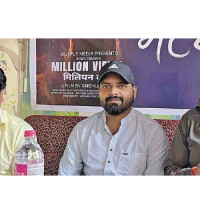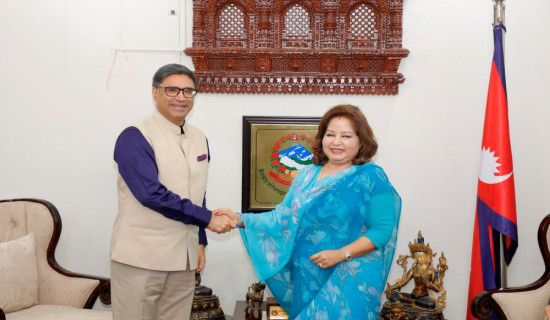- Monday, 18 August 2025
Insights Of Diplomatic Professionals
In the case of an organisation, it may not be a big thing to start a journal, compile an annual report, or prepare a performance audit report, but it is quite a stupendous task to sustain, continue, and retain its standard. That AFCAN (Association of Former Career Ambassadors of Nepal) has been able to bring out its annual report for the third time in a regularly consecutive manner speaks volumes of the enthusiasm on the part of the organisation to play a lead role in the art and craft of diplomacy, irrespective of whether its pool of talents is taken note of or not by concerned authorities.
While all those involved in the contributions of articles and the editorial team truly deserve appreciation, it is to the full credit of the outgoing President, Ambassador Dr. Rambhakta Thakur, that he presided over the professional body for almost three years and ensured the timely publication of three annual reviews seamlessly.
The 2022 issue contains 13 essays on various matters of foreign relations and diplomacy. Understandably, 10 of the contributors are professional diplomats, with five being former chiefs of protocol.
Ambassadors Sundar Nath Bhattarai, Kedar Bhakta Shrestha, Bharat Raj Paudyal, Dr. Rambhakta PB Thakur, immediate past President of the AFCAN, and Bhagirath Basnet, who has taken over as the new President, are contributors.
Other writers are Ambassadors Rudra Kumar Nepal, Hari Kumar Shrestha, Mohan Krishna Shrestha, Dr. Niranjan Man Singh Basnyat, and Ramesh Prasad Khanal.
Likewise, two other non-career ambassadors, Professor Dr. Mohan Prasad Lohani and Dr. Anjan Shakya, have written articles about their respective fields of experience, with Lohani focusing on SAARC matters in the context of Nepal's presidency of the body for the ninth year with no sight of early settlement of the crisis afflicting the organisation, and Shakya concentrating on Nepal's relations with Israel and taking away from Israeli experience in the field of agriculture.
One similarity between Lohani and Shakya is that they have experience working with the Institute of Foreign Affairs, which was conceived to become a think-tank on foreign affairs but was forced to languish in a bad state for many years. Besides, Lohani has solid experience serving as Deputy Permanent Representative of Nepal to the United Nations in New York under stalwarts like Shailendra Kumar Upadhyay and Udhav Deo Bhatt.
Two more contributors to the AFCAN Review are Brigadier General Dharma Bahadur Baniya and Nir Bahadur Karki.
At the end of the book, we find an assortment of photos that shed ample light on the activities and events conducted under the aegis of the professional body during the year.
One interesting attribute of the latest AFCAN Review is that it encompasses all aspects of Nepal's diplomatic odyssey, with the senior most member of the organisation and founder President Ambassador Sundar Nath Bhattarai taking up the widely discussed and pertinent subject of China's global Initiatives like GDI, GSI, and BRI.
These are some of the flagship schemes President Xi Jinping, now in his third term, has launched with quite a fanfare as China marches ahead to achieve its goal of becoming the world's number one economy in the not too distant future.
Ambassador Kedar Bhakta Shrestha, another former President of the AFCAN and an ex-Foreign Secretary, has thought it prudent to highlight Nepal's foreign policy in the context of emerging global trends that pose both opportunities and challenges for policymakers and those entrusted with implementation.
His prognosis is serious and far-fetched in terms of further strengthening our diplomacy and international relations.
The publication also includes Nepal's perceptions and thoughts on the questions of foreign policy and our readings on global affairs in the form of a formal statement delivered to the 77th session of the United Nations General Assembly by Foreign Secretary Bharat Raj Poudyal. This is the first time in the history of Nepal's participation in the United Nations since its formal admission into the world body in December 1955 that a sitting Foreign Secretary has been asked to lead the Nepali delegation to the General Assembly.
Ambassador Dr. Rambhakta Thakur has contributed a piece on discourse on Nepal's hydro diplomacy with various facts and figures, followed by proceedings of the AFCAN seminar on the subject held on July 25, 2022, with the active participation of top experts and officials who have dealt with the issue, including prospects of power export and other concomitant subjects.
Ambassador Bhagirath Basnet has dealt with the pros and cons of practical aspects of the diplomatic code of conduct in our country in the context of international developments since the Congress of Vienna in 1815.
Brigadier General Dharma Bahadur Baniya has written a useful and extensive article on United Nations Peacekeeping Operations with a focus on Nepal's contributions to the area.
Ambassador Rudra Kumar Nepal has been more focused on his well-researched contribution to discuss the core subject of passports and their usage, along with their evolutionary history.
This is a very useful piece to further study the origin and use of passports globally, and it is particularly interesting for me on a personal level as I take my tenure as Foreign Secretary as nothing more than a stop-gap and MRP (machine-readable passport) saga.
Likewise, Ambassador Hari Kumar Shrestha has thought it
proper to deal with Malaysia in both diplomatic aspects and in terms of a travelogue to highlight the history and background of Nepal-Malaysian relations along with his eye-witness account of the country he served with distinction.
Ambassador Mohan Krishna Shrestha has taken up an area that has both historical value and current relevance in terms of the foreign policy of Nepal, passing through several phases. Nir Bahadur Karki has concentrated on the exchange of high-level visits as an instrument of Nepal's foreign relations.
Ambassador Dr. Niranjan Man Singh Basnyat has depicted Nepal's foreign policy in its historical perspective and pinpointed areas that require reforms and changes in the context of the conduct of our foreign affairs. Ambassador Ramesh Prasad Khanal has attempted one interesting aspect of our social life with a unique Nepali smile, representing our diplomatic identity.
In a nutshell, the AFCAN Review is a useful addition to the literature on diplomacy and international relations, and AFCAN justly deserves congratulations on this publication.
(Dr. Bhattarai is a former Foreign Secretary, ambassador, and author; kutniti@gmail.com.)

















